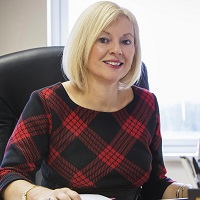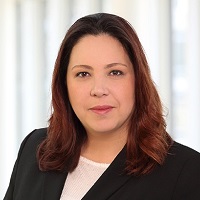
Interview with Crowe tax director Alison D’Arcy for IWD 2020

To mark International Women’s Day 2020, we are featuring women in leadership roles.
In this series we celebrate three women close to our firm: two colleagues and a valued client. We ask them about the achievements they have had and the challenges they’ve faced. They share insights into what this year’s theme means to them and any advice they would have for women starting their career.
In this last interview, we chat with Alison D’Arcy, a director in our tax department.
Tell us a little bit about you and your career.
My current role is as a director here in the Crowe tax department. After I completed my general accountancy training contract, I decided to pursue a career in tax as that was the area that interested me most. I have worked across a broad range of firms, from small practice to the “Big 4”. I am what you might call a generalist as I enjoy working across all areas of tax and not being limited to one area.
The theme for IWD 2020 is “An equal world is an enabled world”. What does that theme mean to you and your workplace?
We spend a large part of our time in the workplace so we should make sure that we make the best of it! We are fortunate in Ireland to have legislation and working practices that confer rights and protections on employees in areas like health & safety, working time and so on, so equality is something that we possible enjoy more of that other societies.
However, it is the culture of a workplace that allows you to be happy and effective as an employee. I believe that a key element in any positive workplace culture is a sense that you are enabled to make the best of your role and the environment around you. Without a sense of equality – how can we be enabled to make the very best of ourselves and our workplace?
Can you share any challenges that you have encountered in your career to date and how you overcame them?
I think the challenge that I found most difficult to overcome was how to balance my career needs with my responsibilities as a mother. There is no single solution to this challenge as it evolves constantly throughout your working life. The key to maintaining balance and managing the challenges you face is to constantly review of your circumstances and keep an open mind to opportunities that become available.
I think we all need to be aware of the challenges that our co-workers face in this area be it as working parents or as carers in another capacity.
How have you built confidence and/or resilience over your career? Do you have any practical tips you can share?
I would say that I have become more and more resilient every year since starting my career. But the greatest influence has been experiencing the positive power of working for someone who respects you.
Also, it is through the challenges that we face and the difficult situations that we manage, that allow us to build skills which in turn builds confidence.
According to recent research (McKinsey report 2019), the biggest obstacle women face is not necessarily the “glass ceiling” but the “broken rung” – the first step up to management. Do you agree?
My own personal experience is that the “broken rung” is not so much an issue. Throughout my career I have worked for, and with, many women that held junior management roles. I think that there continues to be a challenge for women to move forward from junior management to senior management roles – but in the places that I have worked the first step to management is not an obstacle.
Unconscious bias (the preference for or against a person, thing, or group held at an unconscious level) can really affect workplaces and can be a huge problem for organisations trying to be truly diverse. How do you recognise your own biases and have you any examples of unconscious bias you have witnessed?
I believe that unconscious bias is a big influence on how a working environment evolves. Our capacity as co-workers to influence the working environment positively or negatively is something that we all need to be mindful of. I personally try to self-review my approach to working with people or the choices I made when I allocate work amongst the team to see whether I am being biased in my decision-making.
From my own experience, I have seen unconscious bias towards working parents but I believe that this is significantly less prevalent now that when I started my career. Working environments have become more family-friendly through necessity.
I think it is important to be aware of how biases, both conscious and unconscious, have evolved over time and the importance of self-reviewing our attitudes towards all of our co-workers.
Can you share any advice you would give to some now who is developing their career?
- Learn how to say “I don’t know, but I will find out”.
- Understand that complexities exist within relationships and situations – so learn to work with them and not against them
- Appreciate that you spend a significant amount of your life working, so find a job you like!
Alison advises a broad portfolio of personal and corporate clients. She specialises in family business taxation issues, estate and succession planning and tax efficient reward structuring. She also advises on private client taxation with particular expertise in professional firm taxation and capital taxes.
Read other interviews in our International Women's Day 2020 series:
Yolanda Coghlan of Coghlan’s Artisan Bakery
 "Owning this business with my husband I think gives our company an ethos of equality that carries right down to the factory floor. We will not ask anyone to do something that we would not (or do not) do ourselves and that ethos is a strong enabler for the rest of the team."
"Owning this business with my husband I think gives our company an ethos of equality that carries right down to the factory floor. We will not ask anyone to do something that we would not (or do not) do ourselves and that ethos is a strong enabler for the rest of the team."
Crowe Frankfurt managing partner Arzu Güven
 “I think an equal world leads to diversity, which in turn leads to an enabled world. Any team that is made up of the same stereotypes cannot appreciate the larger spectrum of possibilities, opportunities and risks. Such a team is handicapped because of its limited view and scope.”
“I think an equal world leads to diversity, which in turn leads to an enabled world. Any team that is made up of the same stereotypes cannot appreciate the larger spectrum of possibilities, opportunities and risks. Such a team is handicapped because of its limited view and scope.”